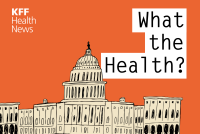
Bird Flu Is Bad for Poultry and Dairy Cows. It’s Not a Dire Threat for Most of Us — Yet.
By Amy Maxmen
Cattle across the country are infected by the H5N1 bird flu. The virus isn’t spreading among people — but if it evolves to do that, fears of another pandemic could be realized.

La gripe aviar es mala para las aves de corral y las vacas lecheras. No es una amenaza grave para la mayoría de nosotros… por ahora
By Amy Maxmen
Las pruebas han detectado el virus en el ganado en nueve estados, principalmente en Texas y Nuevo México, y más recientemente en Colorado. Una persona ha dado positivo para el H5N1.

KFF Health News' 'What the Health?': Abortion Access Changing Again in Florida and Arizona
A six-week abortion ban took effect in Florida this week, dramatically restricting access to the procedure not just in the nation’s third-most-populous state but across the South. Patients from states with even more restrictive bans had been flooding in since the overturn of Roe v. Wade in 2022. Meanwhile, the CEO of the health behemoth UnitedHealth Group appeared before committees in both the House and Senate, where lawmakers grilled him about the February cyberattack on subsidiary Change Healthcare and how its ramifications are being felt months later. Alice Miranda Ollstein of Politico, Sarah Karlin-Smith of the Pink Sheet, and Rachana Pradhan of KFF Health News join KFF Health News’ Julie Rovner to discuss these stories and more. Plus, for “extra credit,” the panelists suggest health policy stories they read this week they think you should read, too.

Daily Edition for Thursday, May 2, 2024
Health insurance for immigrants, funeral settlement, youths’ climate change lawsuit, and more are in today’s news.

In Oregon, Medicaid Is Buying People Air Conditioners
By Samantha Young
Oregon has started providing air conditioners, air purifiers and power banks to help some of its Medicaid recipients cope with soaring heat, smoky skies and other dangers of climate change. It’s a first-in-the-nation experiment that expands a Biden administration strategy to take Medicaid beyond traditional medical care and into the realm of social services. “Climate change is […]

Robert F. Kennedy Jr. Is Wrong About a Ban on NIH Research About Mass Shootings
By Louis Jacobson, PolitiFact
Since 2020, the National Institutes of Health and other federal agencies have collectively funded millions of dollars in gun-related research, including studies addressing mass shootings.

DIY Gel Manicures May Harm Your Health
By Tarena Lofton
A TikTok user claims to have developed an allergy from DIY gel nails. What gives? An allergist weighed in. Let’s walk through what happened in this viral video.

California Floats Extending Health Insurance Subsidies to All Adult Immigrants
By Jasmine Aguilera, El Tímpano
The legislature is considering taking the first steps to make Covered California plans available to immigrants without permanent legal status. The state has already extended Medi-Cal coverage to low-income immigrants.

California propone ampliar subsidios de seguros de salud a todos los inmigrantes adultos
By Jasmine Aguilera, El Tímpano
California es el primer estado en ampliar Medicaid a todos los adultos que reúnan los requisitos, independientemente de su estatus migratorio, una medida celebrada por los activistas de la salud y por líderes políticos de todo el estado.

Rompiendo una promesa: déficit en California podría frenar aumentos a cuidadores de personas con discapacidades
By Vanessa G. Sánchez
Las organizaciones sin fines de lucro señalan que California ha vuelto más difícil retener a los trabajadores en tareas de cuidado después que aumentara los salarios en otros sectores vinculados a los servicios y la salud.